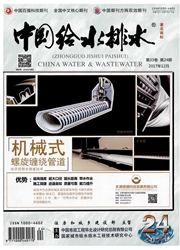

 中文摘要:
中文摘要:
在剩余污泥中接种含混合嗜热菌的驯化种泥,通过批式运行,考察了不同温度下污泥中VSS、TSS、蛋白质等的溶解情况。结果表明,接种嗜热菌能促进悬浮固体的溶解,最适宜的处理温度为65℃,在该温度下处理120h后,TSS和VSS的最大溶解率可分别达31.94%和48.04%,而朱接种条件下的最大溶解率仅分别为19.69%和28.82%。微曝气条件下SCOD得到了累积,65℃处理72h后SCOD出现最大值(4699mg/L),有利于厌氧消化。此外,由于接种混合嗜热菌还促进了蛋白质的溶解,蛋白质和氨氮含量均是先上升后缓慢下降,说明蛋白质的溶解和氨氮浓度的变化均为动态平衡的结果。
 英文摘要:
英文摘要:
The domesticated seed sludge containing mixed thermophilic bacteria was inoculated in excess sludge. The solubilization of volatile suspended solids (VSS), total suspended solids (TSS), protein and so on in sludge under different temperatures was investigated through batch operation. The results show that the inoculated thermophilic bacteria can solubilize suspended solids. Under the optimal temperature of 65℃, the maximal solubilization rates of TSS and VSS are 31.94% and 48.04% after 120 h, while the maximal solubilization rates by noninoculated thermophilic bacteria are only 19.69% and 28.82%. Under the microaeration condition, the maximal soluble chemical oxygen demand (SCOD) of 4 699 mg/L occurs at temperature of 65℃ and after 72 h, benefiting the anaerobic digestion. The inoculated thermophilic bacteria can also solubilize protein, with rise and then fall of protein and ammonia nitrogen concentration, indicating the homeostasis of protein and ammonia nitrogen concentrations in the S-TE process.
 同期刊论文项目
同期刊论文项目
 同项目期刊论文
同项目期刊论文
 期刊信息
期刊信息
